- Home
- Nicholas Sparks
The Longest Ride Page 8
The Longest Ride Read online
Page 8
"Most days," he answered. "When I'm checking on the cattle. I could use the Gator, but I grew up doing it on horseback, and that's what I'm used to."
"Do you ever just ride for fun?"
"Every now and then. Why? Do you ride?"
"No," she said. "I've never ridden. There aren't too many horses in Jersey City. But growing up, I always wanted to. I think all little girls do." She paused. "What's your horse's name?"
"Horse."
Sophia waited for the joke, but it didn't come. "You call your horse 'Horse'?"
"He doesn't mind."
"You should give him a noble name. Like Prince or Chief or something."
"It might confuse him now."
"Trust me. Anything is better than Horse. It's like naming a dog Dog."
"I have a dog named Dog. Australian Cattle Dog." He turned, his expression utterly matter-of-fact. "Great herder."
"And your mom didn't complain?"
"My mom named him."
She shook her head. "My roommate is never going to believe this."
"What? That my animals have - in your mind - strange names?"
"Among other things," she teased.
"So tell me about college," he said, and for the next half hour, she filled in the details about her daily life. Even to her ears, it sounded dull - classes, studying, social life on the weekends - but he seemed interested, asking questions now and then, but for the most part allowing her to ramble. She described the sorority - especially Mary-Kate - and a little about Brian and how he'd been behaving since school started. As they talked, people began to drift through the lot, some threading among the trucks with a tip of their hats, others stopping to congratulate Luke on his rides.
As the evening rolled on and the temperature dropped, Sophia felt goose bumps form on her arms. She crossed her arms, hunkering down in her chair.
"I've got a blanket in the cab if you need it," he offered.
"Thanks," she said, "but that's okay. I should probably be getting back. I don't want my friends to leave without me."
"I figured," he said. "I'll walk you back."
He helped her down from the pickup and they retraced their earlier path, the music growing louder as they approached. Soon they were standing outside the barn, which was only slightly less crowded than it had been when she'd left. Somehow it felt as though she'd been gone for hours.
"Do you want me to come in with you? In case Brian is still around?"
"No," she said. "I'll be fine. I'll stick close to my roommate."
He studied the ground, then raised his eyes. "I had a nice time talking to you, Sophia."
"Me too," she said. "And thanks again. For earlier, I mean."
"I was glad to help."
He nodded and turned, Sophia watching as he started away. It would have ended there - and later she would wonder whether she should have let it - but instead she took a step after him, the words coming out automatically.
"Luke," she called. "Wait."
When he faced her, she raised her chin slightly. "You said you were going to show me your barn. Supposedly, it's more rickety than this one."
He smiled, flashing his dimples. "One o'clock tomorrow?" he asked. "I've got some things to do in the morning. How about if I pick you up?"
"I can drive," she said. "Just text me the directions."
"I don't have your number."
"What's yours?"
When he told her, she dialed it, hearing the ring a few feet away. She ended the call and stared at him, wondering what had gotten into her.
"Now you do."
5
Ira
I
t's growing even darker now, and the late winter weather has continued to worsen. The winds have risen to a shriek, and the windows of the car are thick with snow. I am slowly being buried alive, and I think again about the car. It is cream colored, a 1988 Chrysler, and I wonder whether it will be spotted once the sun has come up. Or whether it will simply blend into the surroundings.
"You must not think these things," I hear Ruth say. "Someone will come. It won't be long now."
She's sitting where she'd been before, but she looks different now. Slightly older and wearing a different dress... but the dress seems vaguely familiar. I am struggling to recall a memory of her like this when I hear her voice again.
"It was the summer of 1940. July."
It takes a moment before it comes back. Yes, I think to myself. That's right. The summer after I'd finished my first year of college. "I remember," I say.
"Now you remember," she teases. "But you needed my help. You used to remember everything."
"I used to be younger."
"I was younger once, too."
"You still are."
"Not anymore," she says, not hiding the echo of sadness. "I was young back then."
I blink, trying and failing to bring her into focus. She was seventeen years old. "This is the dress you wore when I finally asked you to walk with me."
"No," she says to me. "This is the dress I wore when I asked you."
I smile. This is a story we often told at dinner parties, the story of our first date. Over the years, Ruth and I have learned to tell it well. Here in the car, she begins the story in the same way she'd always done for our guests. She settles her hands in her lap and sighs, her expression alternating between feigned disappointment and confusion. "By then, I knew you were never going to say a word to me. You had been home from university for a month, and still you never approached me, so after Shabbat services had ended, I walked up to you. I looked you right in the eyes and I said, 'I am no longer seeing David Epstein.'"
"I remember," I say.
"Do you remember what you said to me? You said, 'Oh,' and then you blushed and looked at your feet."
"I think you're mistaken."
"You know this happened. Then I told you that I would like you to walk me home."
"I remember that your father wasn't happy about it."
"He thought David would become a fine young man. He did not know you."
"Nor did he like me," I interject. "I could feel him staring at the back of my head while we walked. That's why I kept my hands in my pockets."
She tilts her head, evaluating me. "Is that why, even when we were walking, you said nothing to me?"
"I wanted him to know my intentions were honorable."
"When I got home, he asked if you were mute. I had to remind him again that you were an excellent student in college, that your marks were very high, and that you would graduate in only three years. Whenever I spoke with your mother, she made sure I knew that."
My mother. The matchmaker.
"It would have been different had your parents not been following us," I say. "If they hadn't been acting as chaperones, I would have swept you off your feet. I would have taken your hand and serenaded you. I would have picked you a bouquet of flowers. You would have swooned."
"Yes, I know. The young Frank Sinatra again. You have said this already."
"I'm just trying to keep the story accurate. There was a girl at school who had her eye on me, you know. Her name was Sarah."
Ruth nods, looking unconcerned. "Your mother told me about her, too. She also said that you had not called or written to her since you had returned. I knew it was not serious."
"How often did you talk to my mother?"
"In the beginning, not too much, and my mother was always there. But a few months before you came home, I asked your mother if she would help me with my English and we began to meet once or twice a week. There were still many words I did not know, and she could explain their meaning in a way that I could understand. I used to say that I became a teacher because of my father, and that was true, but I also became a teacher because of your mother. She was very patient with me. She would tell me stories, and that is another way she helped me with the language. She said I must learn to do this myself, because everyone in the South tells stories."
I smile. "What stories di
d she tell?"
"She told stories about you."
I know this, of course. There are few secrets left in any long marriage.
"Which was your favorite?"
She thinks for a moment. "The one from when you were a little boy," she finally says. "Your mother told me that you found an injured squirrel, and despite the fact that your father refused to let you keep it in the store, you hid it in a box behind her sewing machine and nursed it back to health. Once it was better, you released it in the park, and even though it ran off, you returned every day to look for it, in case it needed your help again. She would tell me that it was a sign that your heart was pure, that you formed deep attachments, and that once you loved something - or someone - you would never stop."
Like I said, the matchmaker.
It was only after we were married that my mother admitted to me that she'd been "teaching" Ruth by telling her stories about me. At the time, I felt ambivalent about this. I wanted to believe that I'd won Ruth's heart on my own, and I said as much to her. My mother laughed and told me she was only doing what mothers have always done for their sons. Then she told me that it was my job to prove that she hadn't been lying, because that's what sons were supposed to do for their mothers.
"And here I thought I was charming."
"You became charming, once you were no longer afraid of me. But that did not happen on that first walk. When we finally reached the factory where we lived, I said, 'Thank you for walking with me, Ira,' and all you said was, 'You are welcome.' Then you turned around, nodded at my parents, and left."
"But I was better the next week."
"Yes. You talked about the weather. You said, 'It sure is cloudy,' three times. Twice you added, 'I wonder if it will rain later.' Your conversational skills were dazzling. By the way, your mother taught me the meaning of that word."
"And yet, you still wanted to walk with me."
"Yes," she says, looking right at me.
"And in early August, I asked if I could buy you a chocolate soda. Just like David Epstein used to do."
She smooths an errant tendril of her hair, her eyes holding steady on my own. "And I remember telling you that the chocolate soda was the most delicious that I had ever tasted."
That was our beginning. It's not a thrilling tale of adventure or the kind of fairy-tale romance portrayed in movies, but it felt like divine intervention. That she saw something special in me made no sense at all, but I was bright enough to seize the opportunity. After that, we spent most of our free time together, although there wasn't much left of it. By then, the end of summer was already approaching. Across the Atlantic, France had already surrendered and the Battle of Britain was under way, but even so, the war in those last few weeks seemed far away. We went for walks and talked endlessly in the park; as David once did, I continued to buy her chocolate sodas. Twice, I brought Ruth to a movie, and once, I took both her and her mother to lunch. And always, I would walk her home from the synagogue, her parents trailing ten paces behind, allowing us a bit more privacy.
"Your parents eventually came to like me."
"Yes." She nods. "But that is because I liked you. You made me laugh, and you were the first to help me do that in this country. My father would always ask what you had said that I found so funny, and I would tell him that it was less about what you said than the way you would say things. Like the face you made when you described your mother's cooking."
"My mother could burn water and yet never learned how to boil an egg."
"She was not that bad."
"I grew up learning how to eat and hold my breath at the same time. Why do you think my father and I were as thin as straws?"
She shakes her head. "If your mother only knew you said such terrible things."
"It wouldn't have mattered. She knew she wasn't a good cook."
She is quiet for a moment. "I wish we could have had more time that summer. I was very sad when you left to go back to university."
"Even if I'd stayed, we couldn't have been together. You were leaving, too. You were heading off to Wellesley."
She nods, but her expression is distant. "I was very fortunate for the opportunity. My father knew a professor there, and he helped me in many ways. But the year was still very hard for me. Even though you had not written to Sarah, I knew you would see her again, and I worried that you might still develop feelings for her. And I was afraid that Sarah would see the same things in you that I did, and that she would use her charms to take you away from me."
"That would have never happened."
"I know this now, but I did not know it then."
I shift my head slightly, and all at once there are flashes of white in the corners of my eyes, a railroad spike near my hairline. I close my eyes, waiting for it to pass, but it seems to take forever. I concentrate, trying to breathe slowly, and eventually it begins to recede. The world comes back in bits and pieces, and I think again about the accident. My face is sticky and the deflated air bag is coated with dust and blood. The blood scares me, but despite this, there is magic in the car, a magic that has brought Ruth back to me. I swallow, trying to wet the back of my throat, but I can make no moisture and it feels like sandpaper.
I know Ruth is worried about me. In the lengthening shadows, I see her watching me, this woman I have always adored. I think back again to 1940, trying to distract her from her fears.
"And yet despite your concerns about Sarah," I say, "you didn't come home in December to see me."
In my mind's eye, I see Ruth roll her eyes - her standard response to my complaint. "I did not come home because I could not afford the train ticket," she says. "You know this. I was working at a hotel, and leaving would have been impossible. The scholarship only covered tuition, so I had to pay for everything else."
"Excuses," I tease.
She ignores me, as always. "Sometimes, I would work at the desk all night and still have to go to class in the morning. It was all I could do not to fall asleep with my book open on the desk. It was not easy. By the time I finished my first year, I was very much looking forward to coming home for the summer, if only to go straight to bed."
"But then I ruined your plans by showing up at the train station."
"Yes." She smiles. "My plan was ruined."
"I hadn't seen you in nine months," I point out. "I wanted to surprise you."
"And you did. On the train, I wondered whether you would be there, but I did not want to be disappointed. And then, when the train pulled into the station and I saw you from the window, my heart gave a little jump. You were very handsome."
"My mother had made me a new suit."
She emits a wistful laugh, still lost in the memory. "And you had brought my parents with you."
I would shrug, but I am afraid to move. "I knew they'd want to see you, too, so I borrowed my father's car."
"That was gallant."
"Or selfish. Otherwise, you might have gone straight home."
"Yes, maybe," she teases. "But of course, you had thought of that, too. You had asked my father if you could take me to dinner. He said that you had come to the factory while he was working to ask his permission."
"I didn't want to give you a reason to say no."
"I would not have said no, even if you had not asked my father."
"I know this now, but I didn't know it then," I say, echoing her earlier words. We are, and always have been, the same in so many ways. "When you stepped off the train that night, I remember thinking that the station should have been filled with photographers, waiting to snap your picture. You looked like a movie star."
"I had been in the train for twelve hours. I looked terrible."
This is a lie and we both know it. Ruth was beautiful, and even well into her fifties, men's eyes would follow her when she walked into a room.
"It was all I could do not to kiss you."
"That is not true," she counters. "You would never have done such a thing in front of my parents."
She'
s right, of course. Instead, I stood back, allowing her parents to greet and visit with her first; only then, after a few minutes, did I approach her. Ruth reads my thoughts. "That night was the first time my father really understood what I saw in you. Later, he told me that he had observed that you were not only hardworking and kind, but a gentleman as well."
"He still didn't think I was good enough for you."
"No father thinks any man is good enough for his daughter."
"Except David Epstein."
"Yes," she teases. "Except for him."
I smile, even though it sends up another electric flare inside me. "At dinner, I couldn't stop staring at you. You were so much more beautiful than I remembered."
"But we were strangers again," she says. "It took some time for the conversation to be easy, like it was the summer before. Until the walk home, I think."

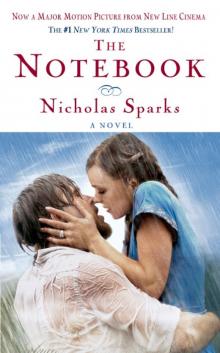 The Notebook
The Notebook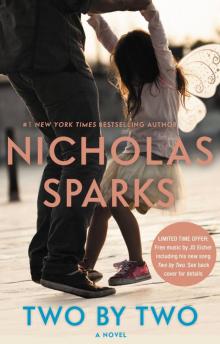 Two by Two
Two by Two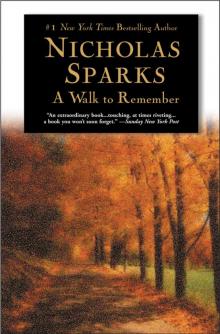 A Walk to Remember
A Walk to Remember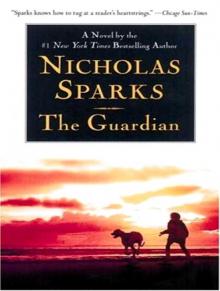 The Guardian
The Guardian Dear John
Dear John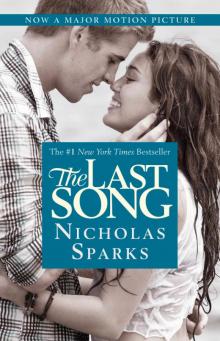 The Last Song
The Last Song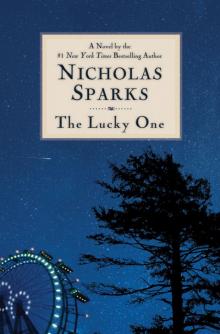 The Lucky One
The Lucky One The Wedding
The Wedding The Longest Ride
The Longest Ride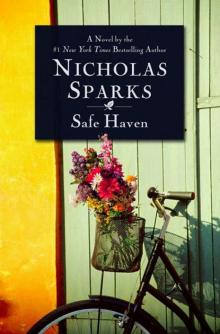 Safe Haven
Safe Haven The Rescue
The Rescue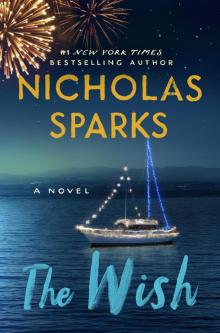 The Wish
The Wish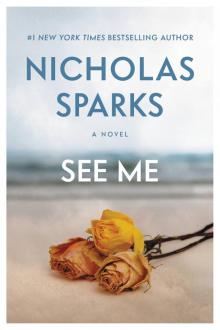 See Me
See Me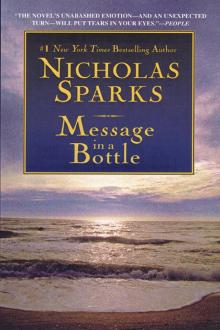 Message in a Bottle
Message in a Bottle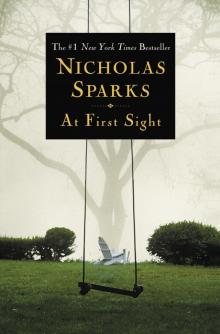 At First Sight
At First Sight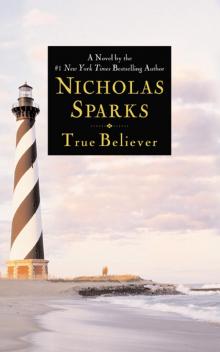 True Believer
True Believer The Return
The Return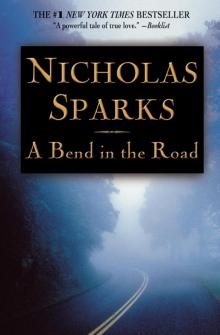 A Bend in the Road
A Bend in the Road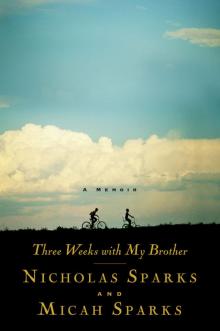 Three Weeks With My Brother
Three Weeks With My Brother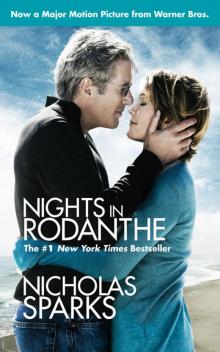 Nights in Rodanthe
Nights in Rodanthe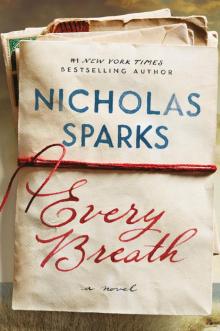 Every Breath
Every Breath